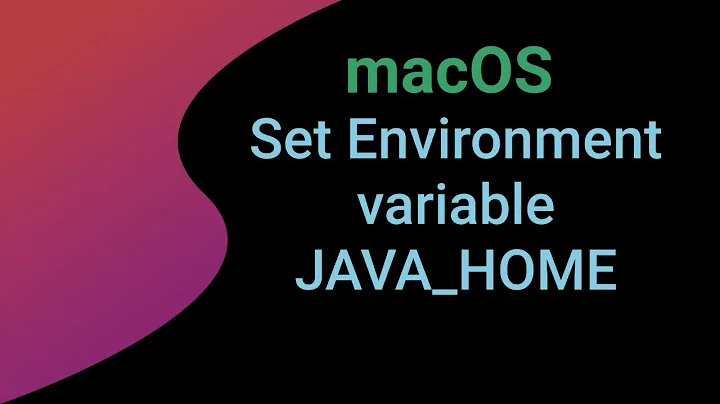How to specify root's environment variable?
Solution 1
I had a similar problem. I looked in my /etc/sudoers file and I saw these lines:
Defaults env_reset
Defaults env_keep = "COLORS DISPLAY HOSTNAME HISTSIZE INPUTRC KDEDIR \
LS_COLORS MAIL PS1 PS2 QTDIR USERNAME \
LANG LC_ADDRESS LC_CTYPE LC_COLLATE LC_IDENTIFICATION \
LC_MEASUREMENT LC_MESSAGES LC_MONETARY LC_NAME LC_NUMERIC \
LC_PAPER LC_TELEPHONE LC_TIME LC_ALL LANGUAGE LINGUAS \
_XKB_CHARSET XAUTHORITY"
To get my environment variable to be there I had to add its name after "XAUTHORITY". In your case you would have:
Defaults env_keep = "COLORS DISPLAY HOSTNAME HISTSIZE INPUTRC KDEDIR \
LS_COLORS MAIL PS1 PS2 QTDIR USERNAME \
LANG LC_ADDRESS LC_CTYPE LC_COLLATE LC_IDENTIFICATION \
LC_MEASUREMENT LC_MESSAGES LC_MONETARY LC_NAME LC_NUMERIC \
LC_PAPER LC_TELEPHONE LC_TIME LC_ALL LANGUAGE LINGUAS \
_XKB_CHARSET XAUTHORITY LD_LIBRARY_PATH"
Give that a try.
Also make sure that you set BASH_ENV="~/.bashrc" in /etc/environment.
See this other answer for more details
Solution 2
Crazy idea, but are you sure that the server actually runs as root? Some servers specify an account that they run under, so even though you invoke the start script as root they are actually running as another user.
Solution 3
The way you've reached your root user matters here. Different methods for "logging in" create different environments.
For example:
- If bash is your root shell, it will read
.bashrcupon startup - If bash is your root shell, and it is a "login" shell, it will read
.bash_profileupon startup - If you are logging in via ssh, it will use
.ssh/environmentas well - If you are logging in via login, that is from the console,
/etc/pam.d/loginwill use pam_env.so to read /etc/security/pam_env.conf (depending on the distro) and /etc/environment (if there is readenv=1) on the command line - etc.
So, if you are not getting the environment you want - you need to figure out the chain of logins that is leading you to the software you are starting. This might be something like: gdm (X) login -> terminal emulator -> bash shell -> su -> bash shell (root) -> software.
However, if you just want to take the best guess, /etc/environment should be read for every process in a recent distributions.
Related videos on Youtube
Paul T.
Programmer, WordPress developer and blogger. Passionate about tech, astronomy and science in general. I am also a big science fiction fan.
Updated on September 17, 2022Comments
-
Paul T. over 1 year
I do rails development. In this app, I need to specify the environment variable
LD_LIBRARY_PATH = /usr/local/oracle/lib, but when I run the app with sudo script/server, it doesn't run because that library path is not in root's env.What should I do to make it work? I tried to put the path under root
./bashrcand it didn't work.-
 Dennis Williamson over 14 yearsWhat is the error message?
Dennis Williamson over 14 yearsWhat is the error message? -
 Admin over 14 yearsthe error message says it can't find oci8 package. but if I run the app w/o sudo, no error (the app doesn't function correctly within the page w/o using sudo though).
Admin over 14 yearsthe error message says it can't find oci8 package. but if I run the app w/o sudo, no error (the app doesn't function correctly within the page w/o using sudo though).
-
-
 Admin over 14 yearsFollowed your approach and I found if I sudo su - , I can see the root does have that library path. However, I still can't get the app up and running, still got the same error message. Any idea?
Admin over 14 yearsFollowed your approach and I found if I sudo su - , I can see the root does have that library path. However, I still can't get the app up and running, still got the same error message. Any idea? -
 Admin over 14 yearsPut $LD_LIBRARY_PATH=/usr/local/oracle_client/v8_1_7/lib in /etc/environment logout and login again.... same error...
Admin over 14 yearsPut $LD_LIBRARY_PATH=/usr/local/oracle_client/v8_1_7/lib in /etc/environment logout and login again.... same error... -
 Admin over 14 yearsSo I tried: sudo env and it says USER=root That means sudo does act as root, right?
Admin over 14 yearsSo I tried: sudo env and it says USER=root That means sudo does act as root, right? -
 Admin over 14 yearsI should've mentioned it's ubuntu... is there an equivalent directory as /etc/profile.d/oracle on ubuntu? thanks.
Admin over 14 yearsI should've mentioned it's ubuntu... is there an equivalent directory as /etc/profile.d/oracle on ubuntu? thanks. -
Catherine MacInnes over 14 yearsYes, sudo acts as root. My question was does the start script for running the server do a sudo of it's own so that the server itself is actually running as a different user. Widely distributed servers do this all the time. For example if you run sudo mysqld start, and the script is invoked as root, but the server ends up running as user mysql. This can occassionally mess with things like library paths.
-
DictatorBob over 14 yearsWait... are you including the "$" in there? It should just be: LD_LIBRARY_PATH=/usr/local/oracle_client/v8_1_7/lib What error do you get exactly? Can you copy-paste the message here?
-
 Return_Of_The_Archons over 14 yearsHmmm... My point was that if you add it to the ld config, you shouldn't need to have it in LD_LIBRARY_PATH. If you run "sudo ldconfig -v" does your oracle directory show up in the output?
Return_Of_The_Archons over 14 yearsHmmm... My point was that if you add it to the ld config, you shouldn't need to have it in LD_LIBRARY_PATH. If you run "sudo ldconfig -v" does your oracle directory show up in the output? -
koti over 14 yearsbetter, put /usr/local/oracle_client/v8_1_7/lib in /etc/ld.so.conf and run ldconfig
-
Kevin Meredith almost 12 yearsWhen I emacs'd my /etc/sudoers file, the file's text warned me against modifying the actual text. It asked me to change the /etc/sudoers.d file. Do you agree?
-
 Dr.jacky over 8 yearsI don't have "env_keep" !
Dr.jacky over 8 yearsI don't have "env_keep" !




